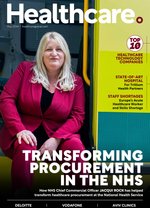Why Sanofi Leads the way on Healthcare Sustainability

The drive to achieve sustainability in healthcare – such a critical area of focus – has left the sector facing unique challenges in terms of supply chain management.
An ageing global population means demand for essential medical supplies is growing, and yet health leaders must meet this demand while minimising environmental impact. Yet amid such challenges lie opportunities for innovation, collaboration and transformation.
The most innovative healthcare companies are revolutionising supply chain practices and embedding sustainability into operations.
Johnson & Johnson (J&J), for example, is reducing its carbon footprint and promoting ethical sourcing practices throughout its supply chain, by partnering with suppliers who share its commitment to sustainability. J&J says this approach is working “to create a more environmentally friendly and socially responsible healthcare ecosystem”.
J&J is aiming to meet all its electricity needs from renewable sources by 2025. It has also set a 2030 target to reduce Scopes 1 and 2 greenhouse gas emissions by 44%.
In 2021, the company joined forces with nine other leaders in the pharmaceutical industry to launch Energize, a first-of-its-kind initiative to help decarbonise the global pharmaceutical supply chain. The programme aims to educate key industry suppliers on renewable procurement opportunities and help them in their transition to renewable energy. Hundreds of suppliers have registered on the platform.
Then, the following year, J&J announced Activate, a collaboration between five pharmaceutical companies to support active pharmaceutical ingredient (API) suppliers in their decarbonisation efforts.
Sustainability as a core healthcare principle
Similarly, Netherlands-based Philips has embraced sustainability as a core principle in its supply chain management approach. Philips was formerly one of the largest electronics companies in the world, but is now focused on health technology, having divested its other divisions. Its healthcare business makes up 42% of its global sales revenue.
The company says it is actively minimising its environmental impact by optimising logistics, investing in renewable energy sources, and implementing innovative packaging solutions.
Through these efforts, Philips aims not only to reduce waste but also to “create value for society and contribute to a healthier planet”.
It also recognises the importance of circular procurement in transitioning towards a circular economy. Circular procurement involves making early choices in product creation to ensure materials and components are suitable for repair, refurbishment and re-use at end-of-life, thereby closing the materials loop.
This approach helps the development of circular products and services. Philips integrates recycled plastics into its products portfolio by collaborating with organisations focused on recycled materials.
Innovative technologies driving supply chain sustainability.
One of the undoubted frontrunners on healthcare sustainability is French pharmaceutical multinational Sanofi, who has achieved the gold standard in sustainability credentials: B Corp status.
B Corp is an international certification awarded to businesses who achieve high standards of ESG transparency, and accountability. It’s one of the most well-respected – not to mention difficult – certifications for a company to earn.
Sanofi has B Corp status for its consumer healthcare operations in North America, Germany, Italy and Hispanic Latin America – a global first for a large consumer healthcare company.
Sanofi Consumer Healthcare North America was the first large, consumer healthcare company to achieve B Corp status.
Sanofi now sits proudly among the 7,000 B Corps globally – of which just 1% are multinationals, those with annual revenue of more than US$1 billion.
“We are honoured to join the B Corp movement alongside other companies aiming to transform business into a force for good,” said Andrew Loucks, Head of North America Consumer Healthcare, Sanofi.
“Our B Corp Certification is another step in our journey to champion better self-care for a healthier society and a healthier planet.”
The US is Sanofi Consumer Healthcare's number-one market, with products in nearly 54 million households in the US and Canada.
Sanofi Consumer Healthcare started the journey for North America in November 2021 conducting a comprehensive assessment of its ESG impact. It delved into every aspect of its operations, from supply chain to employee welfare, environmental sustainability to community engagement.
Sanofi achieved its B Corp status by:
- Reducing Scope 1 and Scope 2 greenhouse gas emissions at its manufacturing site by 77% in 2022 compared to the 2019 benchmark. (Part of its journey to being carbon neutral by 2030 and net zero by 2045.)
- Powering its North American manufacturing and distribution site with 100% renewable electricity since 2020. (Part of its goal to achieve 100% renewables by 2025 for all manufacturing operations globally.)
- Eliminating 35 tons of plastic packaging per year, by removing plastic windows on selected products – reducing the environmental footprint of products and increasing packaging recyclability
In June 2023, Sanofi also accelerated efforts to reach net zero emissions across all its operations (Scope 1 & 2) and its entire value chain (Scope 3) by 2045. This is five years ahead of its original target. The new target is based on the Science Based Targets initiative (SBTi).
“We know that healthier people and a healthy planet go hand in hand,” says Loucks. “We’re proud of the progress we’ve made in our journey to create a business that does well while doing good.”
******
Make sure you check out the latest industry news and insights at Healthcare Digital and also sign up to our global conference series - Tech & AI LIVE 2024
******
Healthcare Digital is a BizClik brand
- McKinsey's APIs Healthcare Scope 3 advice to Big PharmaProcurement & Supply Chain
- Top 10: Sustainable Medical Device ManufacturersMedical Devices & Pharma
- Thermo Fisher Scientific & EY Strike ESG PartnershipSustainability
- Healthcare Business roundup: Baxter, Sanofi & Eli LillyHealth Insurance & Finance


